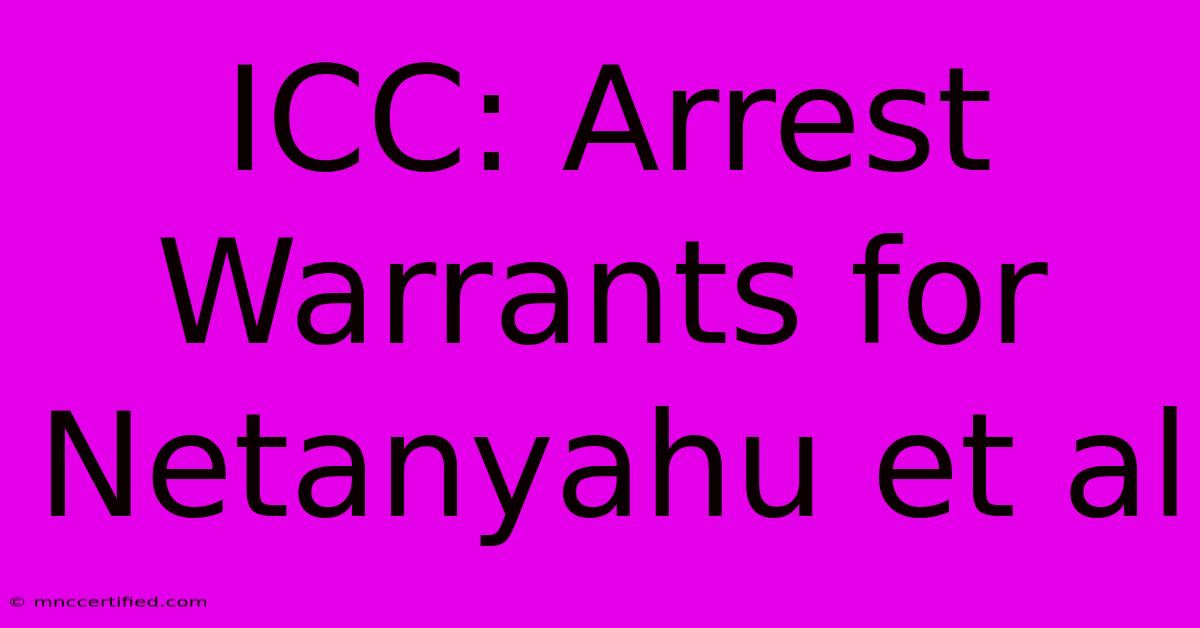ICC: Arrest Warrants For Netanyahu Et Al

Table of Contents
ICC: Arrest Warrants for Netanyahu et al: Understanding the Implications
The International Criminal Court's (ICC) issuance of arrest warrants for Israeli officials, including former Prime Minister Benjamin Netanyahu, has ignited a firestorm of international debate. This article delves into the details of the warrants, the legal framework underpinning them, and the significant geopolitical implications.
Understanding the ICC's Jurisdiction
The ICC is an independent, permanent court established to investigate and prosecute individuals accused of the most serious crimes of international concern, namely genocide, war crimes, crimes against humanity, and the crime of aggression. It's crucial to understand that the ICC's jurisdiction is limited. It only has power to prosecute individuals, not states themselves. Furthermore, its jurisdiction is triggered only under specific circumstances, often involving a state's failure to prosecute crimes within its own territory.
The ICC's authority relies heavily on the principle of complementarity. This means the Court will only intervene if a state is unwilling or unable genuinely to investigate or prosecute crimes falling within its jurisdiction. The ICC's investigation into alleged crimes in the Palestinian Territories stems from the assertion that Israel is failing to adequately address these allegations.
The Allegations Against Netanyahu and Others
The arrest warrants issued by the ICC relate to alleged war crimes and crimes against humanity committed during the 2014 Gaza conflict, also known as Operation Protective Edge. The specific allegations against Netanyahu and other Israeli officials vary, but generally include accusations of:
- Unlawful killings: Allegations of disproportionate use of force resulting in civilian casualties.
- Deportations: Claims of unlawful transfer of Palestinian populations.
- Attacks on protected persons: Accusations targeting medical facilities and humanitarian aid workers.
It's vital to note: These are allegations, and the individuals named have the right to defend themselves against these charges. The ICC process involves a rigorous investigation and trial, adhering to international legal standards.
Geopolitical Ramifications and International Reactions
The ICC's actions have elicited strong reactions from Israel and its allies, who argue that the Court lacks jurisdiction over Israeli actions in the occupied territories. Israel does not recognize the ICC's authority in this context and has refused to cooperate with the investigation. The United States, a staunch ally of Israel, has also expressed strong opposition to the warrants, citing concerns about the ICC's legitimacy and potential bias.
Conversely, Palestine and many human rights organizations welcome the ICC's investigation and the issuance of arrest warrants, viewing it as a crucial step towards accountability for alleged human rights violations. The international community remains deeply divided, reflecting the complex political realities surrounding the Israeli-Palestinian conflict.
The Path Forward: Challenges and Uncertainties
The ICC warrants present significant challenges, both legally and politically. The practical enforcement of the warrants remains uncertain, especially given Israel's refusal to cooperate. The warrants could escalate tensions in the region and further strain relations between Israel and the international community. The process is likely to be protracted, involving legal challenges and potential appeals.
Furthermore, the issue highlights the ongoing debate about the ICC's effectiveness and legitimacy, particularly its ability to navigate complex geopolitical situations. The case underscores the broader challenges of ensuring accountability for international crimes in contexts marked by deep political divisions and competing narratives.
Conclusion: A Complex and Evolving Situation
The ICC's arrest warrants for Netanyahu et al represent a significant development in the long-standing conflict between Israel and Palestine. The situation is multifaceted, involving complex legal considerations, geopolitical ramifications, and deeply rooted historical grievances. The coming months and years will likely witness further legal battles, political maneuvering, and potentially heightened tensions. Understanding the context, the legal framework, and the diverse perspectives involved is crucial for navigating this evolving and highly sensitive situation.

Thank you for visiting our website wich cover about ICC: Arrest Warrants For Netanyahu Et Al. We hope the information provided has been useful to you. Feel free to contact us if you have any questions or need further assistance. See you next time and dont miss to bookmark.
Featured Posts
-
Obituary John Prescott Aged 86
Nov 22, 2024
-
Prescotts Path Rayners Political Ascent
Nov 22, 2024
-
Car Insurance Quotes Santa Clara
Nov 22, 2024
-
Utility Trailer Rental Insurance
Nov 22, 2024
-
Snowflake Stock Rises On Positive Earnings Report
Nov 22, 2024